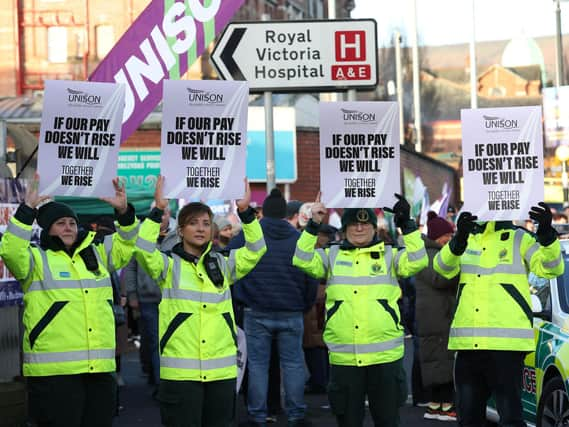Northern Ireland health service rocked by biggest strike yet as tens of thousands of workers take to the picket lines


Tens of thousands of workers took to picket lines at hospitals across all five regional health trusts on Thursday, with nurses, care assistants, technicians, cleaners, paramedics, catering staff and other professions all taking part in the one-day action.
It had been organised by three of the health service's largest unions - Unison, Nipsa and Unite - as part of a UK-wide campaign for better pay.
Advertisement
Hide AdAdvertisement
Hide AdAnother trade union, the Royal College of Nursing, had staged strike action in Northern Ireland last month - and in England in recent days - but has said a decision on further industrial action in Northern Ireland will be made in the "coming weeks".
The involvement of the three unions during Thursday's action meant that, for the first time during the current industrial campaign, the impact on the Northern Ireland Ambulance Service was heightened.
While Nipsa and Unison staff had staged strike action before Christmas, the decision by Unite members to join the strikes following a vote in favour of industrial action in a recent ballot has added to the pressure.
Both union representatives and health authorities said 'derogations' had been secured in advance of the strike to ensure "life and limb" calls classed as high priority could still be attended to.
Advertisement
Hide AdAdvertisement
Hide AdSpeaking to the News Letter outside Altnagelvin hospital on Thursday morning, one ambulance service worker said staff can no longer go on "absorbing" the impact of successive real terms pay cuts as inflation continues to spiral.
Roddy Lynch, joint chair of Unison's North West branch in the Northern Ireland Ambulance Service, said: "We've suffered a real terms pay cut over the last 10 to 12 years while MP's wages have gone up by almost £20,000. Staff are struggling and they've been absorbing this for years while prices remained sort of stagnant, but prices have gone so high at the minute that everyone is struggling."
He continued: "I've been in the ambulance service for 27 years and over the last 10 to 12 years with all the cuts that have been imposed, there has probably never been a good time to go on strike. The difference is that we have been absorbing that and we just feel it's time that we have to stand up for ourselves. How far does it go? How many more cuts? How much more cost of living crisis can we endure? The answer is we can't let that go on. We have to stand up for ourselves."
John Wray, a support services worker at Altnagelvin, expressed a similar view: "We want a pay rise. We didn't get one last year and we want a decent pay rise. Everybody applauded us during covid, we were really essential people but now we just seem to be cast aside. The NHS has been in a bad crisis - and the government refuses to use the word - for the last 10 years. Us being on strike hasn't added to that crisis."
Advertisement
Hide AdAdvertisement
Hide AdCarmen Brady-James, a healthcare assistant who works in the community, highlighted the differential in the pay on offer for agency staff and those employed directly by the health service.
"They're paying the agency staff a lot of money to come in and cover shifts because we're in dire straits but the nurses that are already here are leaving because they can't sustain their living with the wages that they're paid," she said "If they paid the nurses their rightful wages, they wouldn't have to employ bank staff and spend all that money. If they can afford the agency staff, surely they can afford to pay their own staff."
The Department of Health said it “fully understands the frustration and deep concern of staff across health and social care, who have worked in extremely challenging circumstances over the last three years and continue to do so” but stressed that the dispute is “only resolvable at national level”.
Earlier this week, Prime Minister Rishi Sunak insisted he is not able to “wave a magic wand” and that giving pay rises to striking staff would lead to money being taken away from “elsewhere in the NHS budget”.
But he insisted that the Government would continue to “engage in dialogue with the unions”.